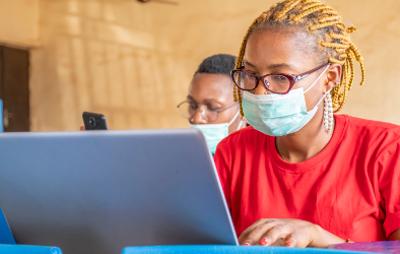Pathways - e-Assessment for African Higher Education

A project funded by the OU is addressing the urgent need for online assessments across the African continent.
Educational experts at the OU’s Institute of Educational Technology (IET) and Faculty of Wellbeing, Education and Language Studies (WELS) have been working with partners in the African Council for Distance Education (ACDE) to promote professional development programmes for educators, professional staff and heads of department who share responsibility for providing quality distance and online learning across Africa.
The Pathways: e-assessment for African Higher Education will be discussed at the OU COVID-19 Research: Online Learning and Education seminar, a free event which will take place on Thursday, 27 May 2021. The seminar will showcase OU-funded research that has taken place during the COVID-19 pandemic to support online learning, teaching and training. Register for the seminar here.
The project, led by Professor Denise Whitelock, Director of IET, alongside Dr Tim Coughlan, Senior Lecturer in Educational Technology at the OU, and Dr Nashwa Ismail, Research Associate at the OU, expands on previous knowledge exchange programmes that the OU have run with partners in Africa.
From working in the region prior to the COVID-19 pandemic, it became clear that educators and institutions in the region were open to exploring practices in online learning as a solution to existing challenges. This could also provide an opportunity to improve blended learning across the African continent. However, the pandemic has created the urgent need to shift teaching online across the continent.
The Pathways: e-assessment for African Higher Education project was set-up to expand on the previous Pathways for Learning project, where rapid professional development programmes were delivered to support educators taking their teaching online in response to the pandemic. This was based around existing open education resources and activities hosted on OU-developed platforms, such as nQuire and Our Journey.
The new project has involved a participatory survey to identify specific regional challenges, raised by local educators across Africa, and address their needs. Of the educators who have responded to the survey, participants from a social sciences, STEM and physical science have been among the most common academic routes which have engaged.
Tim Coughlan discusses the background to OU’s E-assessment resources for HE in Africa project
On the motivations for delivering e-Assessment support in the region, Dr Tim Coughlan stated:
“Due to the global impacts of the Covid-19 pandemic, pressure was placed on how assessments could be carried out and resource was needed to help educational institutions across the regional begin to do assessments online. There are a lot of different areas within that where help is required.
“Our first steps have been to run some polls with participants, pooling for information on what topics of assessment require the most urgent support.”
Adding to how participants have been involved in the project, Dr Nashwa Ismail stated:
“The way we are running the e-Assessment project is by consulting and being informed by the input of participants from the previous Pathways for Learning project. In the previous project, which ran in 2020, we were working on different platforms, speaking to participants on social, polls, and from direct feedback.
“What became very clear from the onset of the COVID-19 pandemic is that we need to give more help.
“To provide more support we evaluated the feedback from previous projects and went through a more detailed survey to get more information about why e-Assessment is a challenge and to focus on the most challenging issues addressed.“
Educators across Africa are making the OU aware of national, regional, and local problems that they are facing.
Based on research pooled from survey participants, respondents have raised a number of concerns in relation to the use of online forms of teaching for typically in-person activities, such as physical sciences.
Respondents have also raised concern about the increase in class numbers, with tutors finding teaching more challenging due to large numbers of students.
Alongside the questions within the survey, which has allowed participants to select answers based on challenges which were highlighted in previously polling data, free text fields have allowed educators to raise localised issues in their own words.
For a comprehensive solution to be provided, the OU is collaborating closely with partners in the African Council for Distance Education to develop a pathway for e-Assessment that can provide support to all levels of education.
Nashwa Ismail covers the activities of OU’s E-assessment resources for HE in Africa project
Using a variety of resources
As a part of the project, short, bite-size videos will be produced which will provide educators with step-by-step guides to implement e-Assessment and online learning styles in their setting.
By using these short micro-lecturers, educators can test teaching methods, consider their utility in their contexts, and co-evaluate the practice in a webinar with fellow educators. Alongside the video resources, educators will be provided with downloadable materials designed for areas with low-bandwidth as well as access to an online forum to share experiences and allow regional experts to deploy e-assessment independently.
With limited time available for educators to learn around their commitments, and limited broadband and internet infrastructure generally across the continent, small downloadable files can “promote and build an open, pan-African community of educators”, Dr Nashwa Ismail describes.
Adding further:
“Within the 8-week programme (Pathways: e-assessment for African Higher Education), participants were offered supplementary activities including a total of 12 webinars and interactive events alongside use of Our Journey - a new platforms created by IET and nQuire - a web-based platform developed by the OU in partnership with the BBC.
“On the nQuire platform, participants were offered social investigation to research how educators in Africa have modified their teaching to respond to the pandemic and provide timely support. One of the questions on nQuire was about areas that academics find them worrying in dealing with the current changes. In analysing the answers to this question, e-assessment was one of the top-ranked challenges.
In the follow-up discussion on the platform, the majority of participants found that that they see the shift to online learning is expected to be permanent after the end of the pandemic. However, some features of e-assessments (e.g. integrity) are one of the challenges they confront to implement this permanent shift.”
Contact our news team
For all out of hours enquiries, please telephone +44 (0)7901 515891
Contact detailsNews & articles

The FUNdamentals: Why fun matters more than we think
In a world that feels increasingly serious and pressured, fun can seem like a guilty pleasure — something optional, even frivolous. But what if fun isn’t an add on at all? What if it’s essential?